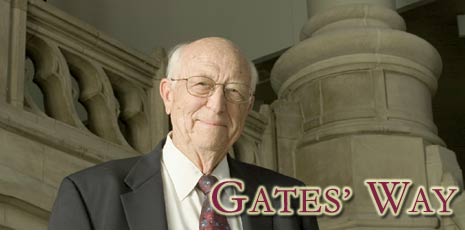

The University of Washington weaves through the life of William H. Gates Sr. like a thread of purple and gold. He earned both his B.A. and his law degree here in 1949 and 1950, he met his first wife-Mary Maxwell Gates-here, and one of his three children is an alumna. His wife served as a regent for 18 years and his son used to sneak computer time on UW mainframes when he was in high school. Later that son, Bill Gates, and his high school friend Paul Allen, would found Microsoft. Gates Sr. now serves as co-chair of the Bill and Melinda Gates Foundation and has been a UW regent since 1997. Many awards have been bestowed on Gates Sr. for his five decades of public service. At an age when many men and women would retire-he is 78-he is leading another civic mission as chair of "Campaign UW: Creating Futures," the largest fund-raising effort ever attempted in the Pacific Northwest. The UW hopes to raise $2 billion over an eight-year period. In an exclusive interview with Columns Editor Tom Griffin, Gates Sr. explores his many UW ties.
Was the UW the only place you considered for college?
GATES: It was the only place.
You grew up in Bremerton, where your dad owned a furniture store. You graduated from Bremerton High in 1943 and came to the UW. How long were you a student before you entered the military?
GATES: I was here for one year-the school year of 1943-44-and went into the service in June of '44.
College was an expensive proposition in 1943 for a family, wasn't it?
GATES: It was expensive, but I think that tuition was really very modest as a matter of fact. I wouldn't be surprised if it was in the $50 neighborhood. But on top of all that, there was room and board and books. It was significant, but I was a child of a distinctly middle class family and my father had a business and a reasonable income.
You did work for your dad, too?
GATES: I did, as a matter of fact. I worked at the furniture store. Summers I would work on the delivery truck.
What was your impression when you came here in 1943?
GATES: There were a lot of people in uniform. Female prevalence was somewhat evidenced by the fact that there were a couple of student-body elections and in both cases a woman was elected. I'm not even sure there was a male candidate. I lived in a dormitory right by Frosh Pond. It was called Cascade Hall, a single story, inexpensive wooden dormitory.
You already knew you wanted to go to law school. What appealed to you about law?
GATES: I had been involved in some public speaking when I was in high school and involved in some debate. It seemed like the things that I was interested in were consistent with being a lawyer.
You enlisted rather than were drafted?
GATES: I signed on to the Army Reserve, which enabled me to get the year of college. It took me out of the draft with the clear understanding that I was not going to be called up until 1944.
And later you were posted to the Philippines and occupied Japan?
GATES: I was very young when I graduated from officer candidate school. It was 1945. They didn't rush 20-year-olds off to the front line, particularly to be platoon leaders, which is what I was. So they sent me to a basic training camp in Florida. I spent quite a period of time there. And got orders to go overseas in early summer of '45.
By that point you had a good idea that the war was going to be won?
GATES: I was in San Francisco when the first atomic bomb was dropped in Japan. And then within a day or two we got on a ship and started off across the Pacific and the second bomb was dropped. It was only a short time before the Japanese surrendered. And then we went to the Philippines. It was already clear that we would be going to join the occupation in Japan, which indeed happened. So I was shipped up to the northern island called Hokkaido. Then after some months, they diminished the whole occupation intensity and I went down to Tokyo to join the First Infantry Division.
You got out pretty quickly.
GATES: I got home in time to start fall quarter of '46.
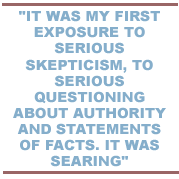 The campus was a lot different than it was even three years before that.
The campus was a lot different than it was even three years before that.And that changes you. You want something different in your life.
GATES: Precisely.
It was brilliant to pass the GI Bill.
GATES: It was stunning. As a matter of fact, it's remarkable to look back and see that there was actually some substantial opposition to it in Congress. Somebody actually argued that it was going to water down the quality of our colleges. Pretty remarkable.
The students that you studied with after the war were a different breed.
GATES: That's true. They were challenging; they were mature; they were serious.
They were probably in a hurry to get out too.
GATES: That's completely true.
And would you say you were one of those types?
GATES: No, not particularly. I looked forward to graduation, but I didn't have any sense of urgency about it.
At a University function a few years ago, you talked about a professor who touched your life. I wondered if you could share that story again.
GATES: His name was William Wilson. He was in the psychology department and his class was a survey course. It was the first time I was really seriously confronted with not taking everything you read or hear for granted. Knowing something to be true was a whole lot more complicated than reading it in a textbook. It was my first exposure to serious skepticism, to serious questioning about authority and statements of fact. It was searing.
At that time we had the Canwell Committee investigating our professors for Communist activities. Did you have any of those professors yourself?
GATES: Actually I did. I had classes from [Philosophy Professor] Herbert Phillips, who was one of the professors who was discharged. And also [Philosophy Professor] Melvin Rader.
Who eventually was exonerated.
GATES: A major witness testified that Rader had been at some Communist meeting at a particular time and place and ultimately a colleague of yours, Ed Guthman, a wonderful journalist, got busy on that and proved that Rader and his wife had been somewhere else at the time.
Why?
GATES: How could you not be absorbed? This was serious stuff and you know we were inundated with that sort of thing. There was more of that going on in Washington, D.C., of course, than there was here, but it was big time, very critical stuff. Anybody who was thinking about what was happening in this country was thinking about that particular phenomenon.
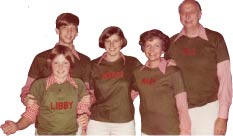
Did you feel bad when your old professor, Herbert Phillips, lost his position?
GATES: Yes, it did hurt. Let me complicate this a little bit. At the same time there was a loyalty oath issue being discussed and then, around that same time, there was a ban on political speakers coming to the campus. I was not sympathetic to the loyalty oath movement and was involved with others who actively undertook to try to get the regents to change their mind about banning political speakers. Ultimately that ban was removed, but not right away.
I know you worked a lot with ASUW although you never ran for a position. How did you get involved?
GATES: It was the typical thing: Being interested in student politics and liking the kind of people that were involved in it.
Speaking of politics, tell me about the civil rights movement at the UW at that time.
GATES: Well, that was the very early days of the serious civil rights movement. It was much less accepted then that we needed to do something to change the way the world was in terms of discrimination. But this was a university campus. It's the kind of subject which, even among relatively conservative people on the campus, the feeling was very, very positive about improving the role of minority people.
I heard you say at a regents' meeting a few years ago, when we had some protesting students, 'You know, I hated the regents too when I was student.' Everybody laughed, but I wanted to ask you why you felt that way?
GATES: It was the business of being a student and feeling like you didn't have enough control and that the regents were curmudgeons stuck in the mud. Specifically there was the speakers ban, about which I felt pretty strongly, and that was regent-maintained. That was the general attitude, that the regents were just a bunch of super conservatives.
If you were speaking to that Bill Gates from 1947-50, what would you say to him about being a regent?
GATES: You're not being fair minded. You don't know as much as you think you do.
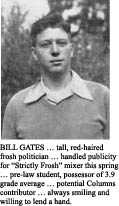
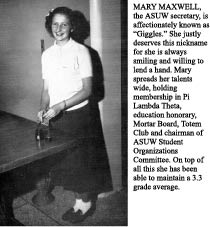
Suddenly you stopped calling the other girls.
GATES: That's right. That did end.
You got your B.A. in 1949 and your law degree in 1950. Were there any professors in law school who were particularly influential?
GATES: One person who made a distinct impression on me was Judson Falknor, who was the dean, a very distinguished and almost patrician sort of a fellow. He was a wonderful teacher and a wonderful dean. And Harry Cross, who was the property law expert.
Go To: Page 1 | Page 2 | Page 3